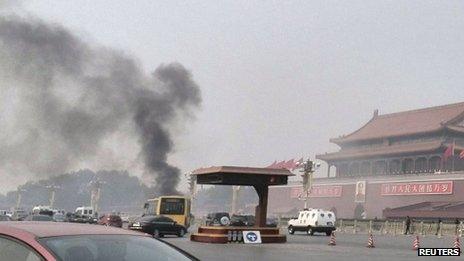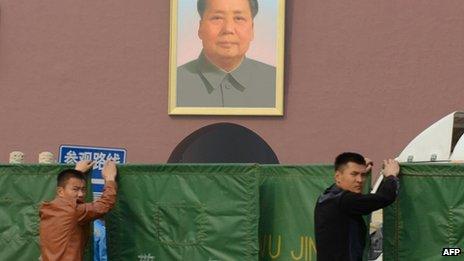Tiananmen blaze triggers online speculation
- Published

Pictures of the scene on Chinese social media were quickly deleted
The lack of authoritative information on the deadly car blaze in Tiananmen Square has given rise to a lot of speculation on Chinese social media.
A sport-utility vehicle ploughed through a crowd of tourists and caught fire in front of the Forbidden City, not far away from China's top leadership compound Zhongnanhai, killing three occupants and two tourists and injuring 38 visitors and security officers, according to official reports.
State media have carried low-key coverage of the incident. State broadcaster CCTV did not even mention it on its flagship evening bulletin at 19:00 local time (11:00 GMT), though its late night bulletin at 22:00 did include a brief announcer-read report without pictures.
On social media platforms such as the Twitter-like weibo microblogs, pictures of the scene were quickly deleted and comments were heavily censored.
But the censorship only resulted in more questions being asked and more interest among the public.
Censorship stokes speculation
On Sina Weibo, China's biggest microblogging website, users complained about the lack of official information on the unprecedented incident and asked for more details.
User Desert Fish wrote: "Who were the persons involved? Did they shout any slogans or throw any flyers? All these questions need answers."
Another netizen, Potato Herring, asked: "Were there explosives in the vehicle? How did the occupants die? What reasons might have been behind the deadly incident?"
User Chenxitingfeng urged CCTV to "release authoritative information as quickly as possible".
Microbloggers also noted the high level of online censorship in the aftermath of the incident.
Major internet portals had banned netizens from posting comments below relevant reports and weibo administrators had deleted a large number of related tweets, according to users.
Some netizens suggested that the level of censorship in itself showed that it was an unusually serious incident.
"Why are they deleting posts everywhere? What's the truth behind it?" asked weibo user Xiaobeida.
"The fact that they deleted the photos is very telling. Was it really just a simple 'car accident'?" asked netizen Zuiwo Hongchen.
Terrorist or petitioner?
Many netizens suspected that it was a planned attack.
"This is definitely a terrorist attack," user Flight Lieutenant wrote.
"This must be a suicide attack by extremists. But what is their objective???" asked user Doctor Wang.
Quite a few netizens have speculated on who might have been behind the incident, which took place in the run-up to an important party meeting scheduled for next month.
Some pointed the finger at separatists from Tibet or Xinjiang, while others said it might have had something to do with supporters of Bo Xilai, whose appeal against his life sentence had just been rejected.
However, the fact that there were three people in the vehicle did not seem to fit the pattern of terror attacks, some netizens said.
"If it were a terrorist attack, there should have been only one person in the vehicle. It shouldn't have been three or more," user Violin Note C wrote on weibo.

The scene of the car crash was rapidly shielded by police
Instead of a terror attack, it was more likely to be a suicide protest by desperate petitioners, argued user Leng Zixing.
"Petitioners in despair would choose to die together as a family, because those left behind would suffer even more," he commented.
"It was a typical act of retaliation against society," said netizen Lexi Yang.
"They could not find solutions to their problems and were forced to take extreme actions. Unless senior officials give common people the right to speak out, such things will keep happening," said Kuailewuji2013.
The incident sparked concern that Chinese society is getting increasingly violent and unsafe.
"This happened in the most heavily guarded place in China. So is there any place left that is still safe?" asked user Mandy Pang.
BBC Monitoring, external reports and analyses news from TV, radio, web and print media around the world. For more reports from BBC Monitoring, click here. You can follow BBC Monitoring on Twitter , externaland Facebook, external.
- Published28 October 2013
- Published28 October 2013
- Published28 October 2013